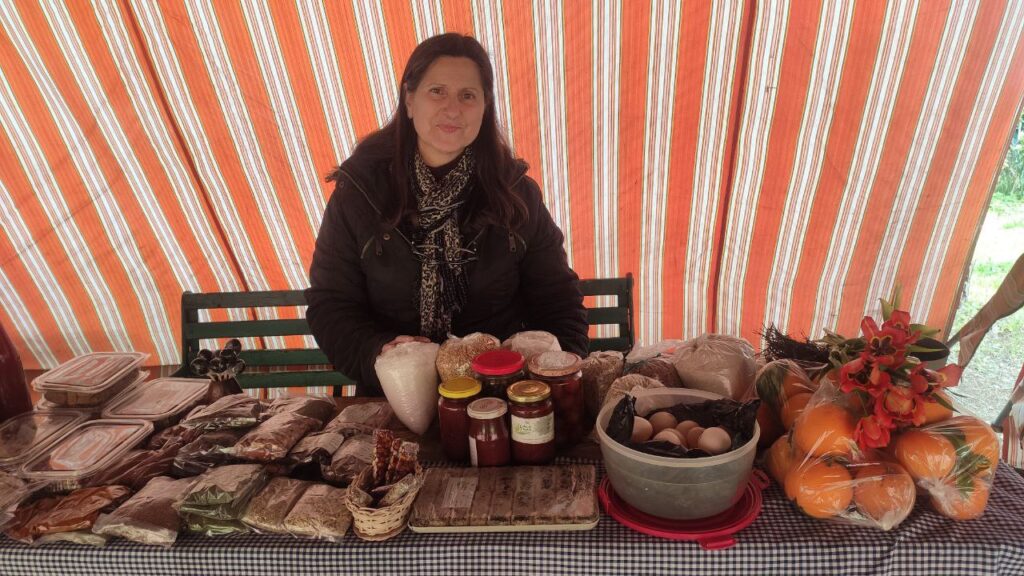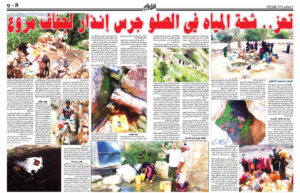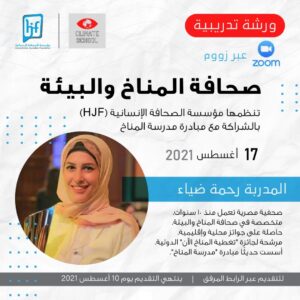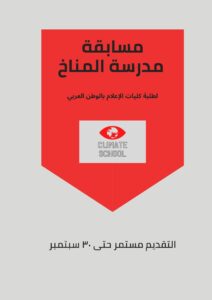Writing and photography - Farah Youssef
On the Corniche of the city of Latakia, opposite its port, specifically in “Al-Fursan” Park every Saturday and Tuesday morning, the green garden gate will take you to “Al-Dayaa Market,” where you feel that you have been transported to another time, crossing it shaded by trees and red tiles.
Wooden tables and colorful tablecloths carry products made by women’s hands, including vegetables, fruits, agricultural products, as well as handicrafts, skin care products, and essential oils. They are surrounded by benches and chairs, preceded by a traditional stone oven (tandoor), and ending with a healthy café.
Within the frame of the painting are tales and stories, the details of which are written by women who refused to be just an added number For statistics It indicates that women's vulnerability to climate change and its repercussions is up to 14 times greater than that of men, so they decided to be active and help their community adapt.
Awareness is the key to the door
“Awareness is the door and the beginning. You must be aware and realize that you are part of the ocean, influencing and being affected by it, and that if you are affected to a greater extent than you are by several factors, this does not mean that you should be indifferent or indifferent. Awareness will push you to produce more and search for the link between your behavior and the planet.” .. says the nanny, Nahla Shaaban, the fifty-year-old woman and mother of four young men and women, a graduate of psychological counseling and a producer in the village market for many years.
Shaaban asserts that “environmental education and spreading the message of climate awareness is a task that falls on women before men in societies like ours, in which women and girls bear greater responsibilities and greater burdens.” “Shaaban” turns some bunches of leafy vegetables between her graceful fingers and offers expert advice to one of the market leaders searching for an herb for a medicinal and therapeutic purpose. She directs him to a table opposite hers, and confirms that “everything we see is the product of my agriculture. My husband and children help me, and I sometimes market for other women’s produce.” From my village.”
With a shy smile on her face, Shaaban points to a basket of local eggs in the middle of the display table, “These eggs belong to my neighbours. Our chickens were wiped out by the plague last year. We do not have even a single chicken left. The pandemic has affected our entire rural areas, and there is official support and denial and rumors here.” There, no one realized the truth of the matter until it was too late. We lost very large numbers.”
With a laugh, she said, “Unfortunately, entire families lost their only source of animal protein. I lost part of my sources of income in addition to the loss of protein... Today I promote these eggs to help my neighbor, and to provide a wider production to market patrons. Many people come to me because they trust that what I offer here is organic and clean, and I produce it with love and passion.” And perception.”
And revealed American study Published in 2020 that climate changes and the expected rise in temperatures in the future will contribute to increasing the geographical expansion of the plague outbreak.
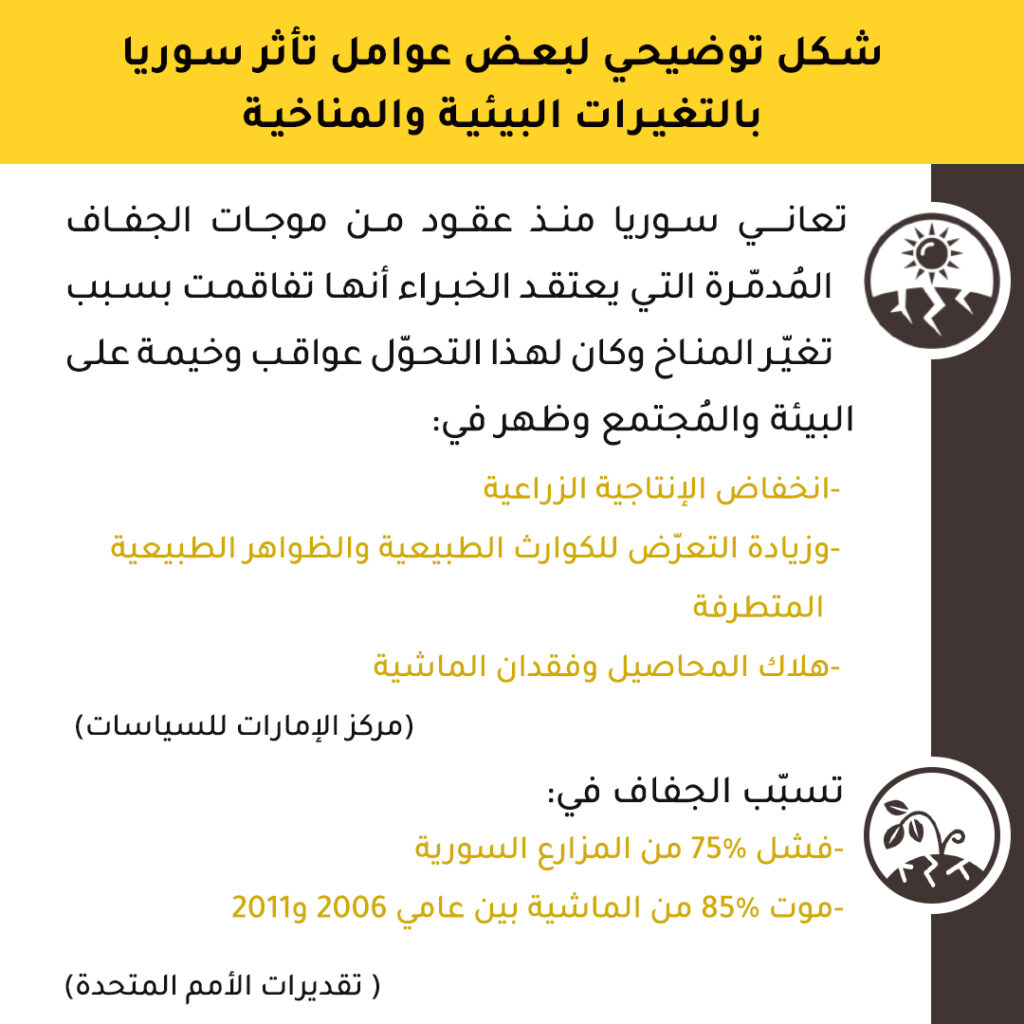
And what is useful? a report According to the FAO, the percentage of women working in agricultural and food systems constitutes 36% of the total number of women working around the world, compared to 38% of men. The report confirms that women’s working conditions are unfair, as work is irregular, part-time, or low-skilled. While women wage workers in agriculture earn 82 US cents for every US dollar earned by men, they have fewer rights to land, and their access to credentials and training is more limited. According to the report, women must work with technology designed specifically for men, resulting in inequalities. A productivity gap of 24 percent between male and female farmers working on equal-sized farms.
“Women cultivate small areas, some of them plant rooftops for family consumption,” adds Nahla Shaaban, who travels approximately 20 km to reach the market. She continues, “Double burdens fall on women in a country affected by climate change as part of the planet.” The woman elaborates on her suffering. And similar female producers: “Rising temperatures, drought, and sudden extreme natural and climatic phenomena made it necessary for us to modify our crops in their methods and types to adapt to the changes. We began planting tropical fruit trees that we had not witnessed growing in the countryside of Latakia. Many of us began planting dragon fruit, for example. This began as experiments.” Individually on the roofs of some houses, after a short time we noticed that they produce fruits that have become desirable in the markets and are produced in quantities that allow them to be grown and marketed, in addition to the shade they form on the roofs of houses, so we benefit from them to reduce the direct temperatures above our homes.”

Women are more affected and productive
“If we, as women, are de facto more affected than men by environmental and climate changes, then it is natural that we, in turn, are more able than men to be active, more adaptable, adaptable, and innovative in proposing solutions that make our lives and our existence on the planet more creative and in harmony with our natural surroundings, and less harmful and affected by negative factors.” The surrounding area,” said the fifty-year-old woman, “Samar Youssef,” as she moved her eyes between the tables of those present and counted the absent producers in the market.
Sisters Sania and Samar Youssef provide various natural products and participate in the various activities of the Environmental Society. “Afforestation and meditation campaigns are closest to my heart,” says Samar, who travels more than 40 km to reach the market. She continues, “In conjunction with the Corona pandemic, awareness has increased about the importance of raising immunity and returning to nature.” Many people turned to healthy products and organic farming products, and I produced carob molasses in small quantities, as it is known for its great benefits in boosting immunity. It became more in demand, so I increased production, and friends helped me promote it on a small scale, and it began to expand more with me joining the market.”
Regarding the cultivation of carobs, she says, “The carob is an oppressed and neglected tree in our country. Despite its benefits and environmental, economic, and health importance, which are almost equal to and even superior to olives, it is exposed to unfair cutting operations. I am trying to spread the culture of its cultivation, by providing seeds and seedlings, and teaching the making of molasses.”

And he points out a report FAO indicates that treating women equally in agricultural and food systems would boost the global economy by US$1 trillion and reduce food insecurity by 45 million people.
In turn, on her table in the middle of the market, the forty-year-old Amal Shaaban displays handmade accessories, toys, mirrors, book dividers, paintings, mirrors, stones, and other handmade artistic products that rely on recycling for their primary materials. She explains this by saying, “The idea began.” From my awareness of reducing consumption, with time, research, and self-learning, I found dimensions greater than mere savings that recycling entails. I use the remains of wood, clothes, bags, and threads, distinct stones from nature that turn into simple and beautiful antiques and gifts that people exchange and acquire with love and awareness of the cumulative values they carry.”
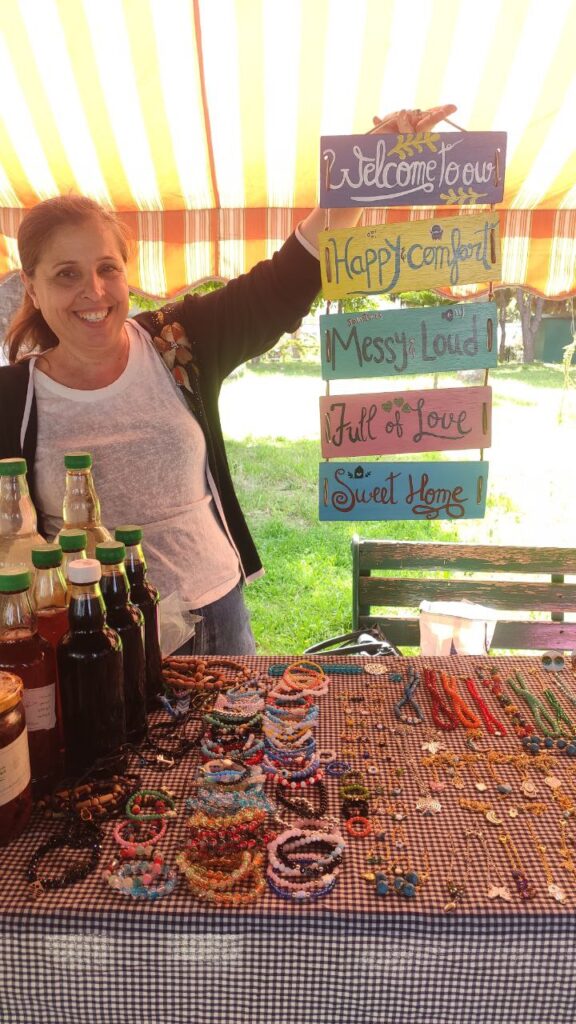
Pharmacist “Zeina Walid,” Chair of the Board of Directors of the “Souq Al Dayaa” Association, explained the association’s role and activities in preserving the environment and promoting health and environmental awareness, especially among women and children. Walid says, “The market began its activity in 2006 with the aim of searching for agriculture without chemicals. The association focuses on health and environmental activities, and about 50 producers participate in it, more than 90% of whom are women, after it was licensed in 2011.”
According to “Walid,” the association carries out environmental and awareness-raising activities that include “afforestation, cleaning, and awareness-raising,” and it faces several challenges in its work. It adapts to the changes, most notably those resulting from the widespread fires that affected large areas in the region, and seeks to reforestation in cooperation with various parties, taking into account emerging data, such as the use of fire-resistant tree species such as terebinth, while preserving the environmental and biological diversity of the region.
Women who create reality
The overwhelming presence of women in the association, described by the pharmacist “Walid,” saying: “We did not search for women. Their presence came de facto. They imposed themselves on the place, in fact, in the various places where we searched for farmers and producers who respected the health and environmental conditions for sustainable agriculture and production. The women were Those who do this, perhaps because they were cultivating small holdings, starting from the gardens of their homes and a few meters in their surroundings, and cultivating them with the intention of personal and family consumption, are more careful than men who are mainly searching for the greatest financial profit from agriculture without realizing the effects of many wrong practices on health, the environment and sustainability. Mutual giving to the planet.”
Data crisis
The Souq Al-Dayaa Association is not alone in the absence of data. Search engines and news websites specialized or interested in environmental and climate affairs suffer from scarcity and absence of information and data related to the Syrian environmental and climate reality, and its impact on women and their being affected by it. Knowledgeable sources in the Environment Directorate in Latakia (preferred not to (He mentioned her name) confirmed that the material and logistical obstacles, the lack of equipment, techniques, and mechanisms, and the absence of budgets, in addition to the migration of talent, constitute, in addition to the failure to empower the directorate with executive powers on the ground, the most prominent obstacles and problems of the directorate that prevent it from performing its tasks, in addition to the absence of public awareness, even at the level of government officials. Local people, with the importance and dimensions of the environmental and climate issue and its direct impact on humans at the near and long levels, are still treated as luxuries.”
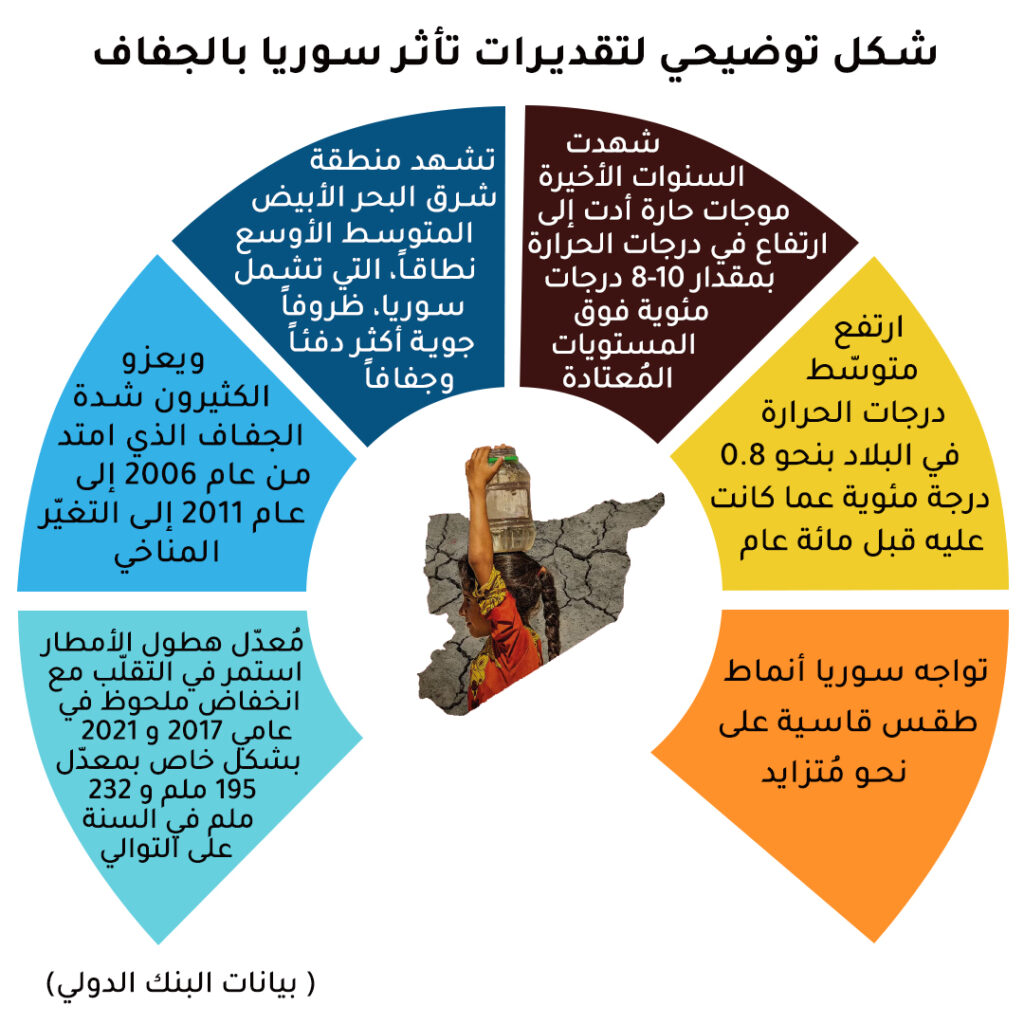
In a country like Syria, agriculture constitutes more than 28% of the gross domestic product. The numbers cannot be ignored in light of its reality, as it confirms a report According to FAO, men have more property rights or secure tenure over agricultural land than women in 40 out of 46 countries reporting on the Sustainable Development Goal indicator, and reports indicate that if half of small producers benefit from development interventions that focus on women’s empowerment, this will lead to an increase in Significantly increased income for an additional 58 million people and increased resilience for an additional 235 million people.
Environment and climate are part of women's responsibilities
Regarding the role of women in confronting environmental and climate changes in Syria, the environmental activist and Executive Director of the Syrian Climate Entrepreneurs Foundation, Farah Asaad, says: “It is a new facet of the challenge that Syrian women are accustomed to. They are capable of the challenge and have mastered making tremendous efforts to reach their goals, despite their great efforts.” Women suffer from skepticism about their abilities to manage large and effective institutions, and this is what I experienced from my experience socially and even officially.”
She adds: “If we separate environmental activity from environmental behaviors, we will find that the Syrian mother and woman in general bears double her responsibility based on the family reality that places the greatest responsibility for education and upbringing on women, in addition to the fact that the Syrian reality imposes on young males to turn towards professional subjects more than they are allowed to do.” Turning towards development issues, we find that young females are the largest and most numerous actors and initiators, and the real experience reflects the tendency of girls and women to fundamentally improve the surrounding environment and think about the sustainability of their resources more, which is part of the reality and the double responsibilities that fall on their shoulders.”
And he confirms a report The United Nations reports that countries with more women in parliament and who participate in local natural resource management often see the adoption of more stringent national climate change policies that result in lower emissions.
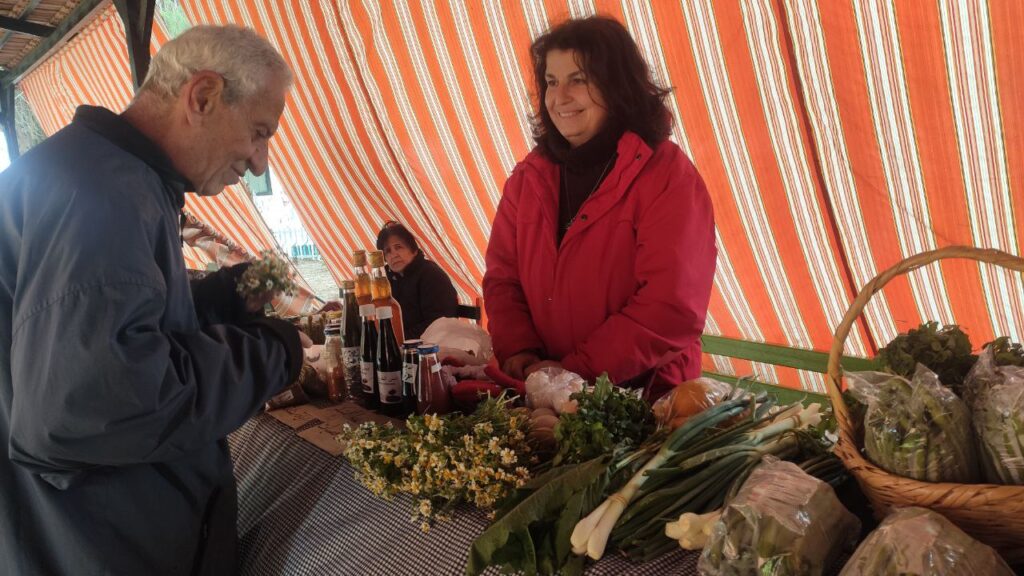
So that the women and girls of the “Souq Al Dayaa” Association remain a living and effective example of Syrian women who decided not to be satisfied with watching and receiving the changes, but rather to plant the roots of work to be a living example that expresses experience, expertise, awareness and knowledge, from a present they are influenced by, towards a future they hope their role will be effective in making it more To shine for their children and grandchildren, and everything that surrounds them as part of this planet, and as part of the message of continuous giving to Syrian women.
-The main photo is of nanny Nahla Shaaban during her work in the village market - Photography: Farah Youssef
This report was prepared within the framework of the “The Roles Women Play in Confronting Climate Change” workshop, which was organized by the Climate School Initiative, with a grant from the Mentoring Center for Emerging Media Initiatives program of the International Journalists Network.

